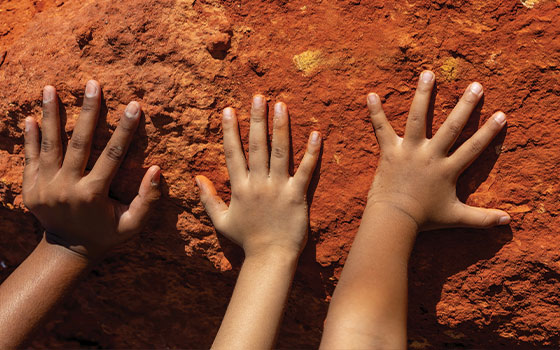Search
News & Events
Aboriginal researcher NAIDOC Person of the YearThe head of Indigenous research at Perth's The Kids for Child Health Research has been honoured as the 2008 National NAIDOC Person of the Year.
News & Events
MEDIA BACKGROUNDER - WA Aboriginal Child Health SurveyThe Western Australian Aboriginal Child Health Survey is the most extensive survey of Aboriginal families ever undertaken.
News & Events
Children the key to breaking the cycle of disadvantageA national strategy that focuses on early child development is the key to breaking the cycle of Aboriginal poor health and disadvantage.
News & Events
Disadvantage begins in the wombAboriginal children are faced with significant impediments to their chances of a healthy life even before they are born.
News & Events
Social disadvantage underpins children's poor healthThe impact of death, separation and divorce is having a profound impact on the lives of Aboriginal children.
News & Events
Infections leave life-long scarsHigh rates of recurrent infection are a major risk to the health of Aboriginal children and are comparable to those of third world countries.

ACCARE provides high level advice to the Institute's Director around strategic directions and operational elements relating to Aboriginal health research
Research
“You can't heal yourself in that setting and you wouldn't expect other people in this country to”: Yarning about housing and environmental health in remote Aboriginal communitiesRemote Aboriginal communities in Australia are located on traditional lands holding deep cultural significance and meaning for residents. However, systemic inequity rooted in colonisation has driven persistent housing and health disparities, with inadequate environmental health conditions within homes and communities a prominent example.
Research
Koolungar (Children) Moorditj (Strong) Healthy Skin Project Part II: Skin Health in Urban-Living Australian Aboriginal ChildrenAlthough essential for overall health and wellbeing, little is known about skin health in urban-living Australian Aboriginal children. This co-designed, research-service project aimed to describe skin health and document skin disease frequency in urban-living Aboriginal children and young people in Western Australia and investigate housing associations for skin infections.
Research
Staying moving, staying strong: Protocol for developing culturally appropriate information for Aboriginal people with osteoarthritis, rheumatoid arthritis, lupus and goutAddressing disparities in arthritis care is an important yet unmet health need for Aboriginal and Torres Strait Islander people in Australia (respectfully Aboriginal people herewith). Despite the significant prevalence and burden of arthritis within Aboriginal communities, access to care for arthritis is low.
